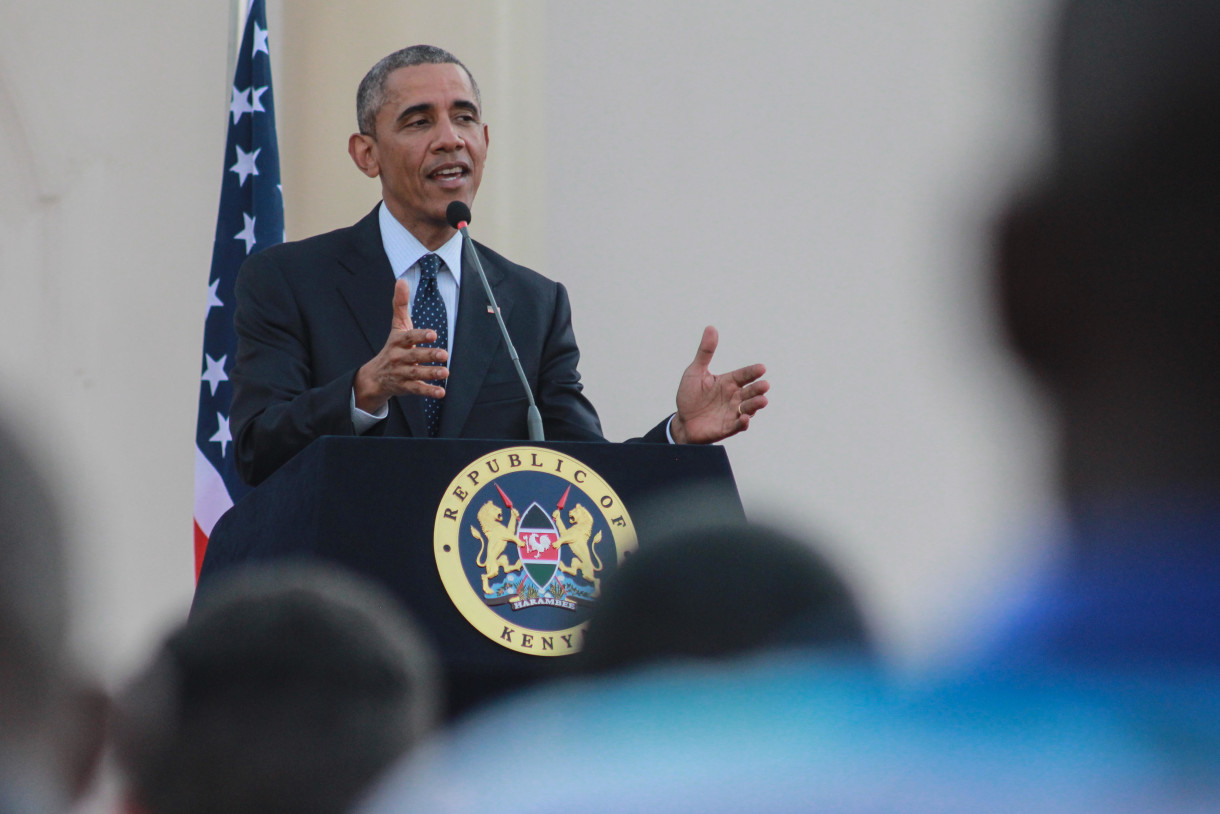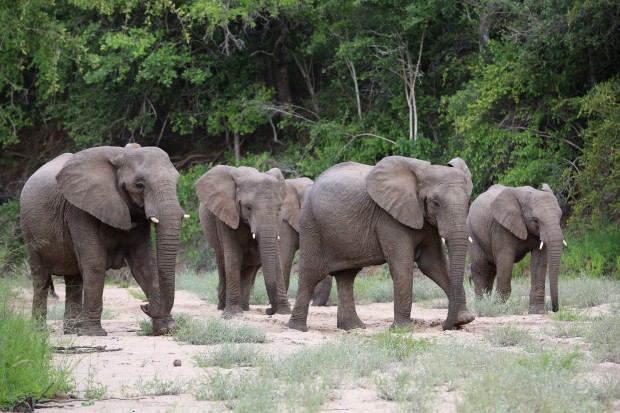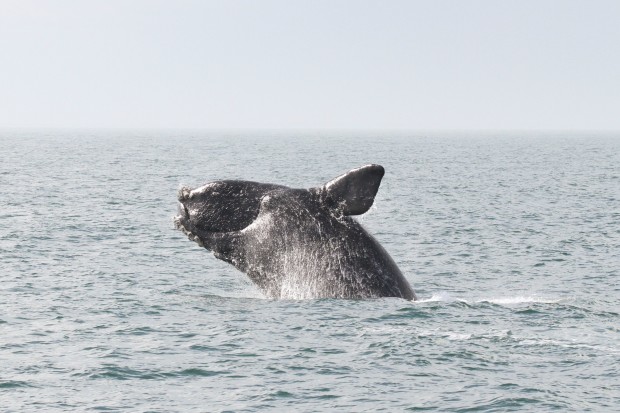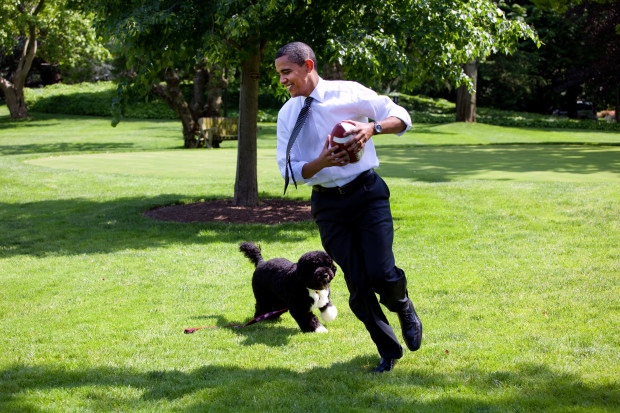
At a press conference in Kenya
last year, President Barack Obama announced that the United States will
take urgently needed steps to curtail wildlife trafficking and address
the elephant poaching crisis. Photo by Alamy
We’ve been working with President Barack Obama and a number
of his cabinet secretaries and executive agency staff on a wide range of
animal welfare policies during the last seven years — from preventing
horse slaughter plants from opening up to halting the slaughter of
downer calves to ending the use of government-owned chimpanzees
in invasive experiments. Today is World Wildlife Day, and it’s an
opportunity for us to turn our attention to the numerous threats facing
wild animals around the globe. Wildlife protection has been a very
active area of collaboration for us and the White House, on everything
from combating the poaching of elephants and rhinos to
protecting right whales along the Atlantic coast to stopping the trophy
hunting of African lions to ending commercial fishing practices harmful
to sea turtles and dolphins to seeking greater protections for polar
bears exploited in the international commercial trade. I had the
privilege and opportunity to ask President Obama about what he considers
some of his top accomplishments in protecting wildlife, and this
interview represents one of the fullest expressions of his views that’s
been published anywhere on his wildlife protection ethic.Q: What do you see as the most important steps you’ve taken in the area of animal protection?
Let me say this first – every step I’ve taken to protect our environment and our wildlife is a personal one for me. I grew up in Hawaii, known for its iconic natural beauty. Needless to say, I spent a lot of time exploring outdoors. It was hard not to learn very early just how easy it is to appreciate – and how hard it can be to protect – the incredible splendor that nature provides us. When I was 11, I had never been to the mainland, and my grandmother, my mother, and my two-year-old sister and I decided to take a big summer trip across the continental U.S. I still remember traveling up to Yellowstone National Park, coming over a hill, and suddenly seeing just hundreds of deer and bison for the very first time. That new scenery gave me a sense of just how immense, how diverse, and how important the vast array of wildlife is to understanding and appreciating the world and our place in it. That’s something I wanted my daughters to understand when I brought them back to the very same spot at Yellowstone a few years ago. And it’s something I want to preserve for our kids, grandkids, and generations to come.
That’s why I’ve taken every opportunity in my time in office to protect the world’s wildlife where I can. We’ve negotiated the highest-standard trade agreement in history that will provide new tools to protect wildlife. We’re leading the world in protecting exploited species of sharks. We’re substantially reducing government research on chimpanzees and providing protection for all chimpanzees in the wild and captivity. And we’re taking new action to recover monarch butterflies and other pollinators and expanding protection and restoration efforts for endangered species here in the United States.
To address the ongoing scourge of poaching that is threatening the existence of species like the elephant and the rhino, I issued an Executive Order about three years ago that directed all agencies of the federal government to work together as a presidential task force to protect these important animals. We’ve also pursued successful efforts to conserve an iconic bird—the greater sage grouse—across 11 western states. It’s the largest planning effort to protect a species in U.S. history, illustrating how a strong national, state, and private collaboration and flexible and effective programs can protect wildlife, benefit the environment and enhance local economies across the country.

“We
currently face the risk of losing wild elephants during my lifetime.”
President Obama says. “It’d be an unpardonable loss for humanity and the
natural world. There’s no question: we need to take urgent action to
save one of the planet’s most majestic species.” Photo by iStockphoto
Q: Text from the Environment Chapter of the recently concluded Trans-Pacific Partnership (TPP) reflects a strong commitment to protecting wildlife. Would you explain how this agreement will combat wildlife trafficking and strengthen international commitments and actions?
This is an important point that I don’t think many people realize about this trade agreement. The TPP puts in place the toughest environmental protections of any trade agreement in history, and they’re targeted to address some of the greatest environmental threats in the Asia-Pacific. After all, the TPP will impact one of the world’s most ecologically diverse regions and includes countries with the greatest demand for illegal wildlife products.
The TPP is packed with fully-enforceable provisions that I’m confident will be effective new tools to curb illegal logging, combat illegal fishing, and protect iconic species like the rhino and the lesser-known – but highly-trafficked – pangolin. Whether poached in Kenya or taken from a protected forest in Vietnam—countries have committed to take action under the TPP to combat wildlife trafficking, regardless of where the poaching originally took place. Countries have also agreed to increase international cooperation and information sharing in pursuit of traffickers, and to implement strong anti-corruption protections to get at bribery and money-laundering and other illegal activities that are often at the root of illegal trafficking schemes. If these measures are found to be ineffective, or a country isn’t upholding its conservation laws—we can bring a formal dispute proceeding, and if we win, we can use trade sanctions against the losing country to help compel their compliance with these rules.
While you might not normally think of a trade deal as a likely avenue for this, the TPP may be one of the most potent tools we have to protect wildlife around the world. We can’t afford to delay such tools and a chance to make real progress, which is why I am doing everything I can to secure them before I leave office.
You can read the entire environmental chapter in TPP for yourself here.
Q: At a recent peak in poaching of elephants, it was estimated that one elephant was killed in Africa every 20 minutes – with much of the killing conducted by militias who turn tusks into cash and are intent on destabilizing nations and looting them of their resources. How has your Administration helped protect the African elephant?
We currently face the risk of losing wild elephants during my lifetime. It’s an unbelievable statement. It’d be an unpardonable loss for humanity and the natural world. There’s no question: we need to take urgent action to save one of the planet’s most majestic species and address the security threat posed by insurgency groups and dangerous criminal networks whose trade in ivory and other resources funds their activities.
We have proposed a near-complete ban on the import and domestic sale of elephant ivory that will shut down domestic markets for illegal ivory, making it harder for criminals to profit from poaching. We have also put new resources into aggressively expanding international enforcement efforts, training prosecutors, and other efforts to stop criminal organizations around the world from making a profit through poaching. In September, we negotiated a similar commitment with President Xi Jinping of China, which is the largest market in the world for illegal ivory. China will also put in place a near-complete ban on domestic commercial trade and the U.S. and China will work together on joint training, technical exchanges, and law enforcement efforts to combat wildlife trafficking. We are providing significant funding and technical assistance through agencies like the U.S. Fish and Wildlife Service, the State Department, and USAID to range countries in Africa to support elephant conservation and anti-poaching efforts. Secretary Kerry, Secretary Jewell, and I have all separately visited Africa in the past 12 months, and we have each highlighted our grave concerns about poaching. During these trips we announced numerous new programs that assist African countries in strengthening conservation efforts, building law enforcement capabilities related to illegal trafficking, and enhancing cooperation between African countries to reduce ivory trade across international borders.
More broadly, our Task Force on Combating Wildlife Trafficking is working to combat illegal trafficking of all wildlife species by strengthening global law enforcement cooperation, educating consumers here and around the world to reduce demand for illegally-traded wildlife, and building partnerships with governments, civil society, and businesses.
I won’t let up on any action or any step I can take to help protect the wild elephants. The world, and the wonder it affords, would be immeasurably dimmed if we fail.

Today,
the Obama Administration will move forward with regulations that will
enhance the protection of marine mammals like whales and seals here and
around the world. Photo by the Georgia Department of Natural Resources
Protecting our oceans is a top priority for me and my Administration. We hosted the first-ever Our Oceans conference in 2014 and established a Presidential Task Force that is using a whole-of-government approach to combat illegal fishing, a practice that is devastating our precious ocean resources and undermining legitimate fishermen everywhere. In 2014, I expanded the Pacific Remote Islands National Monument, creating the largest marine monument in the world, making it off-limits to development. Today, I am moving forward with regulations that will enhance the protection of marine mammals like whales and seals here and around the world.
But we can also use the power of markets to promote conservation of our resources. As I noted before, the TPP will give us new tools to enhance protections of threatened marine species from harmful fishing practices and illegal fishing—with commitments to promote sustainable management of their fisheries, reduce the amount of species that are unintentionally caught, and promote the long-term conservation of sharks, sea turtles, seabirds, and marine mammals like whales and polar bears. Under the TPP, countries are also on the hook to prevent and address marine pollution from ships which harm coastal and marine environments at the expense of beachgoers, fishermen, and ocean life at all levels of the food chain, from barnacles to blue whales.
Q: Are there any other wildlife issues — problems of exploitation — that stir you and you wish you could see turned around?
There’s long been tension between those who’ve sought to protect our wildlife and conserve our natural resources for the benefit of future generations, and those who have sought to profit off of those resources. To me, that’s always been a false choice. We can be smart about the clean, sustainable policies we pursue that will protect the wildlife and beauty we cherish while helping our economy grow.
So six weeks after I took office, I decided to restore vital protections for wildlife that face extinction. For more than thirty years, the Endangered Species Act has successfully protected our nation’s most threatened wildlife, and we should always be looking for ways to protect them, not make them more vulnerable. That’s a tenet I’ve lived by since day one of my presidency.
Today, we can say that we’ve made unprecedented progress restoring once-declining wildlife populations in the United States and recovering animals that were once endangered. It’s a good moment when you see species coming off the endangered list. Animals like the humpback whale and the Louisiana black bear are on the mend. Those bears are big! And while I wouldn’t want to tangle with one, I’m glad my kids and grandkids will have the chance to see them in action. Other beloved animals like Florida’s manatee and California’s condor have made stunning comebacks from the brink of extinction. Once-rare plants, fish, and other species, like the New England cottontail, are regaining their strength in numbers, too.
But our planet is still facing an extinction crisis. My Administration has made it a priority to continue to find solutions that will reverse the course we’re on, using every tool available to protect our natural resources for future generations. I’m working on delivering as many victories on this front as possible, permanently protecting more public land and water than any of my predecessors. And I’ll continue to work with states, private landowners, and other crucial partners around the world on behalf of the most vulnerable wildlife. After all, they are the living, breathing reflections of the world we hope to preserve for future generations. As stewards of the Earth, it will take all of us to make sure we live up to that responsibility.
So, thank you for your passion and dedication to that stewardship. Your vigilance has helped make the progress we’ve made together possible. When I no longer hold this office, I will be right there next to you in the role of citizen, doing what I can alongside you to help build and protect the world we’re fighting for.



No comments:
Post a Comment